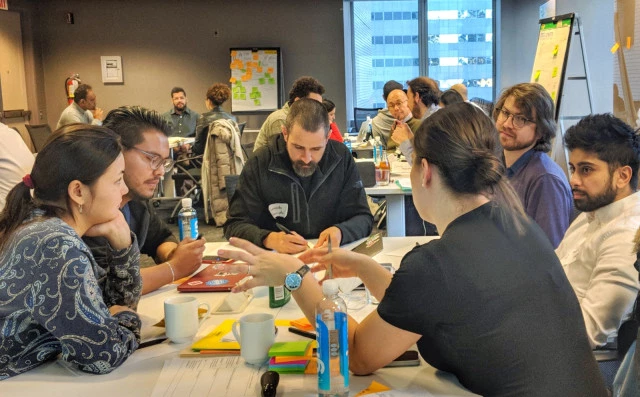This story is part of BREAKER’s Social Good Week, a series looking at ways blockchain technology can engineer progress and help humanity.
It’s day four at UNICEF’s blockchain startup workshop, and presenter Chantal Yang from the Medici Group asks the room how they would make their companies more diverse.
Karim Chabrak, founder of Coinsence, raises his hand. “We could hire one woman.”
He means well, but the room erupts in laughter—perhaps from the tension of discussing diversity among 12 blockchain startup founders, only one of whom is female.
The group, however, is more diverse than the usual sea of pale you’d see at a blockchain gathering. UNICEF funded six companies working on open source blockchain projects in developing markets—the attendees of this Midtown Manhattan-based workshop—so no company in the room looks like the cast of “Silicon Valley.”
Sid Chakravarthy, founder and CEO of Statwig, which aims to bring supply chain tracking to vaccine delivery in India, hits this point home. What’s missing from his team, he says, is a “white American man.” Everyone laughs again.
The “diversity and inclusion” talk is first on today’s busy schedule. Then there’s a quick break, then a work-plan review, then a couple hours dedicated to “telling your company’s story” to journalists. In the first three days of the workshop, participants have already gone over business strategy, product development, technical “deep dives,” and an overview on working with UNICEF’s Innovation Fund.
The fund, which was created in 2015, has given up to $100,000 to each of the startups in this room. This is the first year the Innovation Fund has a specific blockchain cohort, and the companies in it weren’t easy to find.
“We select organizations working in developing and emerging countries,” says Cecilia Chapiro, head of the startup cohort, who had to learn about the technology quickly when the fund’s former blockchain leader left. “If you were to look for blockchain companies in the U.S. or Western Europe, there’s so many of them…but it’s very hard to find a blockchain startup in Kenya.”
UNICEF did not find a blockchain startup (worth funding) in Kenya. Instead, they come from India, Tunisia, Argentina, Singapore, Mexico (and Mexico), and Bangladesh. They aim to democratize funding for social good enterprises, facilitate community organization, and prevent the misappropriation of government spending. The most advanced group, a Mexico-based digital prescription platform called Prescrypto, has helped issue more than 140,000 prescriptions, putting users’ full medical histories all in one place for simple, secure access by doctors.
Blockchain startup founders getting advice from a mentor during the workshop. Courtesy of UNICEF

It’s easy to tell that people have been “ideating” in the workshop’s conference room. It’s bland, as a conference room should be, but it’s covered in colorful post-its, some with childlike drawings of faces, others with acronyms like “KYC” and strings of tech buzzword associations like “education, Trello, gamification.” These blockchain startups have been hard at work participating in capital A Activities, and by the time I show up at the workshop, the founders feel like friends, or at least exude the forced intimacy of a work family. The night before, they all went out for cocktails, and this morning they’re commiserating. Someone thanks a UNICEF lead for the “work hard, play hard” environment.
Ariana Fowler, one of the designated workshop “mentors,” used to work on ConsenSys’s social impact team (several members of which, including Fowler, were laid off in December). She’s been getting good feedback from the participants. “Someone said, ‘This is like 15 years packed into three days,’” she pauses. “It’s a good thing.”
Yang opens up her next slide. It’s a gender-inclusive hiring visualization. We see several, mostly overlapping circles, all in varying shades of blue. Then, a pink circle enters the frame. It (she?) only slightly overlaps with the others. This, we are told, is what happens when a woman enters an entirely male team—she expands their field of expertise.
These slides might make you cringe, but their point is valid. Diversity does increase a company’s field of expertise because it means decisions are being made by people who reflect the populations those decisions will affect. Unless you’re traveling to Greece’s Mount Athos, populations tend to include women.
As the only female founder at the workshop, Audrey Tan is optimistic, even pleasantly surprised, about the morning’s session. “I find it really powerful that we’re even having this conversation,” she says during the 11 a.m. break, as other participants drink shot-sized smoothies courtesy of UNICEF. “It was quite unexpected.”